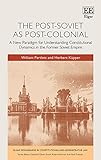The post-soviet as post-colonial : a new paradigm for understanding constitutional dynamics in the former soviet empire / William Parlett and Herbert Kupper.
Language: English Series: Elgar monographs in constitutional and administrational and administrative lawPublication details: Cheltenham : Edward Elgar, 2022.ISBN:- 9781802209433
| Item type | Home library | Collection | Call number | Status | Date due | Barcode | |
|---|---|---|---|---|---|---|---|
 Print
Print
|
OPJGU Sonepat- Campus Main Library | General Books | 342.47 PA-P (Browse shelf(Opens below)) | Available | 146218 |
"This book takes a new approach to post-socialist constitutional change in Europe and Eurasia. It views these constitutions as the products of the collapse of Europe’s last empire, the Soviet Union. This book therefore seeks to understand these constitutions as more than just post-authoritarian texts, but also as post-colonial ones. This post-colonial paradigm provides a new set of tools for understanding constitutional dynamics in key countries within the European Union as well as the former Soviet republics to the East. In particular, it helps explain democratic backsliding in Central Europe (such as Hungary and Poland), authoritarian resilience in many of the former Soviet republics (including Russia, Belarus, and Kazakhstan) as well as ongoing struggles about national identity in places like Ukraine and Moldova. Partlett and Küpper’s application of the post-colonial paradigm to the former Soviet world contributes to our understanding of post-colonial constitutionalism. This insightful book therefore appeals to the comparative constitutional academic community as well as the broader academic community interested in post-colonialism. It will also be of interest to a general audience interested in better understanding the former socialist bloc countries."--
There are no comments on this title.

